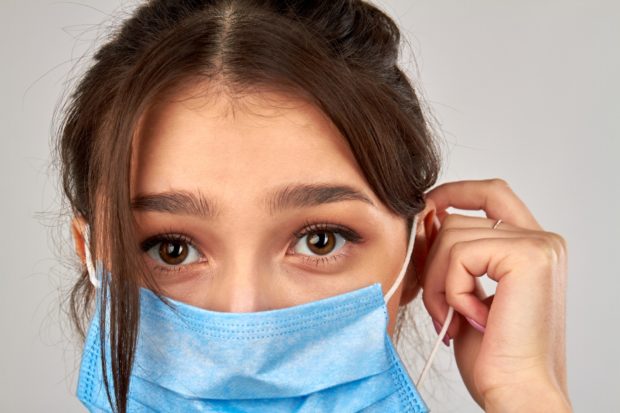If you’re making a mask at home use a combination of two fabrics for better protection, says study

If you want to make your own mask during the COVID-19 pandemic, it’s best to use a combination of two fabrics according to new research. Image: IStock.com/Denisfilm via AFP Relaxnews
A new United States study has found that if you’re masking masks at home during the COVID-19 pandemic, then using a combination of two different fabrics and ensuring a good fit could offer the most effective protection.
Carried out by researchers at the University of Chicago and Argonne National Laboratory, the new study set out to investigate which fabrics are best for filtering the tiny respiratory droplets that are released when a person coughs, sneezes, speaks or breathes and which are thought to spread COVID-19.
The researchers looked at a variety of everyday fabrics easily found around the house including cotton, silk, flannel and polyester-spandex chiffon, which is a sheer, synthetic fabric often used for items such as evening gowns.
To test their effectiveness at filtering droplets, particularly the smallest ones called aerosols, the team used an aerosol mixing chamber to produce particles ranging from 10 nanometers to 6 micrometers in diameter.
A fan then blew the aerosol across various samples of fabric at a speed that mimicked a person’s breathing when at rest. The researchers then measured the number and size of particles in the air before and after they had passed through the fabric.
The findings, published in ACS Nano, showed that when a single layer of fabric was used, the filtration efficiency ranged from 5 to 80% and 5 to 90% depending on the size of the particles.
However, when using multiple layers of fabrics, filtration efficiency significantly increased to more than 80% for smaller particles and more than 90% for larger ones.
The most effective combination for filtering out aerosol particles was found to be a layer of a tightly woven cotton sheet combined with two layers of polyester-spandex chiffon, which filtered out 80 to 99% of particles, depending on their size. In fact, the researchers say that this combination performed close to that of N95 mask material.
If you don’t have any polyester-spandex chiffon to hand, then substituting this fabric with natural silk, flannel or a cotton quilt with cotton-polyester batting was found to produce similar results. The researchers add that cotton, which is the more common material used for cloth masks, performs better when it has a tighter weave, so try to choose cotton with a higher thread count if possible.
However, whatever fabric you choose, the team also points out that getting the right fit is also important, with the results also showing that gaps caused by a bad fit could reduce the filtering efficiency of all masks by over 60%.
The U.S. Centers for Disease Control and Prevention, along with many organizations and governments around the world, recommend that people wear masks when out in public. However, many have questioned whether home-made attempts with everyday fabrics are useful in helping to prevent the spread of the disease.
Based on the new findings, the researchers conclude that masks made using a combination of readily available fabrics still have the potential to provide significant protection from respiratory aerosol droplets. RGA
RELATED STORIES:
Matthew McConaughey, wife Camila to donate 80,000 face masks to COVID-19 frontliners
Woman charged with stealing face masks, hand wash from hospital amid COVID-19
For more news about the novel coronavirus click here.
What you need to know about Coronavirus.
For more information on COVID-19, call the DOH Hotline: (02) 86517800 local 1149/1150.
The Inquirer Foundation supports our healthcare frontliners and is still accepting cash donations to be deposited at Banco de Oro (BDO) current account #007960018860 or donate through PayMaya using this link.